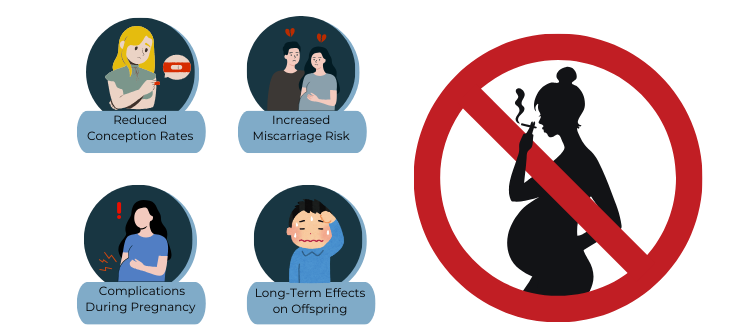Smoking is a well-known health hazard, but its impact on reproductive health is often underestimated. This blog will explore how smoking affects eggs, sperm, and overall pregnancy chances, shedding light on the risks and encouraging healthier lifestyle choices for those planning to conceive.
Effects of Smoking on Eggs
• Ovarian Function: Smoking can lead to reduced ovarian function, accelerating the loss of eggs and leading to early menopause.
• Egg Quality: The chemicals in cigarettes, such as nicotine and tar, can damage the DNA in eggs, reducing their quality and increasing the risk of chromosomal abnormalities.
• Fertility Rates: Women who smoke are more likely to experience infertility. Studies show that smokers are twice as likely to take more than a year to conceive compared to non-smokers.
• Ectopic Pregnancy: Smoking increases the risk of ectopic pregnancy, where a fertilized egg implants outside the uterus, often in a fallopian tube.
Effects of Smoking on Sperm

• Sperm Count: Smoking can significantly reduce sperm count, leading to lower chances of fertilization.
• Sperm Motility: The motility, or movement, of sperm is crucial for reaching and fertilizing the egg. Smoking impairs sperm motility, making it more difficult for sperm to travel through the female reproductive tract.
• Sperm Morphology: Smoking can affect the shape and structure of sperm, leading to a higher percentage of abnormally shaped sperm, which are less capable of fertilizing an egg.
• DNA Damage: Like eggs, sperm can also suffer DNA damage due to smoking, increasing the risk of miscarriage and genetic defects in offspring.
Effects of Smoking on Pregnancy Chances

• Reduced Conception Rates: Couples where either partner smokes have lower conception rates. Smoking affects both natural conception and the success rates of assisted reproductive technologies like IVF.
• Increased Miscarriage Risk: The toxins in cigarette smoke can lead to increased miscarriage rates, affecting early pregnancy outcomes.
• Complications During Pregnancy: Smoking during pregnancy is associated with various complications, including placenta previa, placental abruption, and preterm birth. It can also result in babies being born with low birth weight and developmental issues.
• Long-Term Effects on Offspring: Children born to mothers who smoked during pregnancy are at a higher risk for respiratory issues, sudden infant death syndrome (SIDS), and cognitive impairments.
Quitting Smoking to Improve Reproductive Health
• Immediate Benefits: Quitting smoking can quickly improve fertility in both men and women. Women may see improvements in ovarian function, and men can experience better sperm quality within a few months.
• Support and Resources: Encouraging individuals to seek support for quitting smoking, such as counseling, support groups, and nicotine replacement therapies.
• Healthy Lifestyle: Emphasize the importance of a healthy lifestyle, including a balanced diet and regular exercise, to enhance fertility and improve overall reproductive health.
Looking for top-notch male and female infertility treatment in Delhi?
Veramed Fertility and IVF Center offers hope with its excellent care and skilled specialists. We provide specialized services to tackle different fertility issues. Our modern facilities and personalized care make us a preferred choice for those starting their journey to parenthood.
Conclusion
Smoking poses significant risks to reproductive health, affecting eggs, sperm, and pregnancy chances. Understanding these impacts can motivate individuals to make healthier choices, improving their chances of conceiving and having a healthy pregnancy. Quitting smoking is a critical step towards better reproductive health and a healthier future for both parents and their children.

